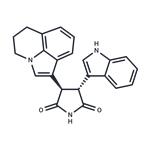MET is a proto-oncogene that encodes the hepatocyte growth factor receptor c-Met. The receptor has normal roles in morphogenesis, migration, apoptosis, and angiogenesis. Dysregulation of c-Met occurs in many types of cancer. Tivantinib is a staurosporine derivative that binds to dephosphorylated c-Met kinase, yet its mechanism of action is not known. Tivantinib has been tested in clinical studies for its ability to selectively inhibit c-Met. However, it can promote mitotic arrest and apoptosis of various human tumor cell lines (EC50s ranging from 60-600 nM) through mechanisms independent of its ability to bind c-Met. Tivantinib has been reported to bind directly to the colchicine binding site of tubulin, reducing tubulin polymerization in cells and in mouse xenograft tumors in vivo.
![3-(5,6-Dihydro-4H-pyrrolo[3,2,1-ij]quinolin-1-yl)-4-(1H-indol-3-yl)-pyrrolidine-2,5-dione](https://www.chemicalbook.com/CAS/GIF/905854-02-6.gif)

